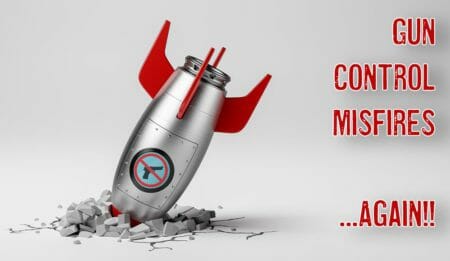

Charlotte, NC –-(Ammoland.com)- 2014 was a highly successful year for NRA in our fight to protect our Second Amendment rights.
Although we didn’t win every battle, our opponents were unable to hold back a wave of pro-gun victories.
Our members and supporters heeded the call to “Stand and Fight” with NRA, helping to elect pro-gun majorities at both the state and federal levels.
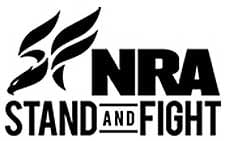
Here is a summary of the top stories brought to you in 2014 by the ILA Grassroots Alerts.
We’ll look to continue our successful trend in 2015, particularly in the U.S. Senate where we will work to push for pro-gun reform while simultaneously working to block any anti-gun initiatives from President Obama’s administration.
January
– NRA continued to support the legal challenge against New York’s recent gun control law, commonly known as the SAFE Act. The suit was brought by the New York State Rifle and Pistol Association, among others. When a state’s legislature oversteps its bounds, NRA demonstrates it can be counted on to file, or support, litigation to ensure that citizens’ rights are protected.
– Detroit police chief, James Craig, voiced his public support for allowing law-abiding citizens to obtain concealed carry permits. Previously serving as police chief in Portland, Maine, after working nearly 30 years in the LAPD, Craig changed his views on the issue of Right-to-Carry after seeing how effective CCW permits were in reducing crime in Maine. Chief Craig understood that the best way he could ensure that citizens were protected was allowing them to protect themselves if need be.
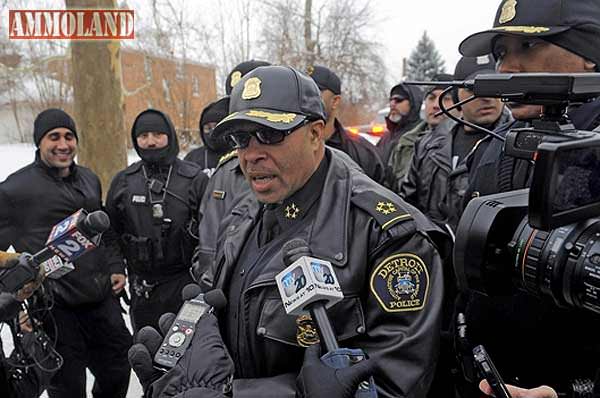
– Colorado-based Magpul Industries, a manufacturer of popular AR-15 ammunition magazines and accessories, announced that it would move its corporate headquarters to Texas and its manufacturing operations to Wyoming due to recently-passed anti-gun legislation. The company’s decision, affecting over 200 employees and 400 supply-chain workers in Colorado, is expected to cost the state over $80 million annually.
February
– President Obama’s State of the Union address contained some disturbing gun control rhetoric, with the President pledging he would continue to promote his anti-gun agenda “with or without Congress.” Frustrated by the legislative defeats his anti-gun bills suffered in Congress in 2013, the President was left with only angry rhetoric and threats to continue flouting the Constitution to force his anti-gun agenda upon the American people, further demonstrating why we must be ever-vigilant.

– The U.S. House of Representatives passed H.R. 3590–the “Sportsmen’s Heritage and Recreational Enhancement (SHARE) Act.” This measure passed with broad bipartisan support by a vote of 268 to 154. The SHARE Act promotes and protects the rights of hunters in a variety of critical ways.
– The Ninth Circuit Court of Appeals confirmed that the Second Amendment protects an individual right to carry firearms for self-defense in public. The landmark decision came in the NRA-supported case of Peruta v. San Diego County, brought on behalf of the CRPA Foundation and five individuals who were denied carry licenses by the San Diego Sheriff. In its ruling, this federal court struck a major blow against “may issue” carry laws that frequently lead to law-abiding citizens having their rights arbitrarily restricted or denied.
March
– The fight over President Obama’s Surgeon General Nominee, Vivek Murthy, began in the U.S. Senate Health, Education, Labor and Pensions Committee. Murthy had a favorable 13-9 vote in that committee, prompting a strong response from NRA-ILA. Murthy’s record of political activism in support of radical gun control measures raised significant concerns about the likelihood he would use the office of Surgeon General to further an anti-gun agenda. NRA-ILA, with the aid of our members contacting their Senators, was able to block the impending nomination at that time.
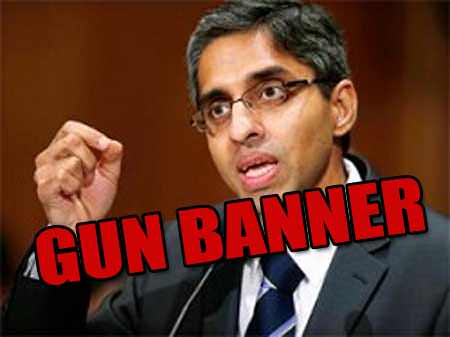
– NRA files a Friend of the Court Brief in the appeal of NSA spying case. NRA supported this case out of concern that bulk data collection could undermine privacy protections in federal law that prohibit creating a registry of firearms or firearm owners. Additionally, the NRA filing argued that the mass data collection violates the First Amendment-protected freedom of association,as it may make individuals fearful of joining organizations like the NRA and speaking their minds on controversial issues. Citizens should not have to fear being watched for exercising their Constitutionally-guaranteed rights in a lawful manner.
– The FBI arrested anti-gun California Senator Leland Yee on firearm trafficking charges. Senator Yee asked for campaign donations in exchange for introducing an undercover FBI agent to an arms trafficker who trafficked in bullet resistant vests, handguns, semi-automatic rifles, shoulder-fired rockets and mines, as well as possibly being tied to money laundering and murder-for-hire plots. Senator Yee also happened to be A+ rated by the Brady Campaign for his anti-gun advocacy.
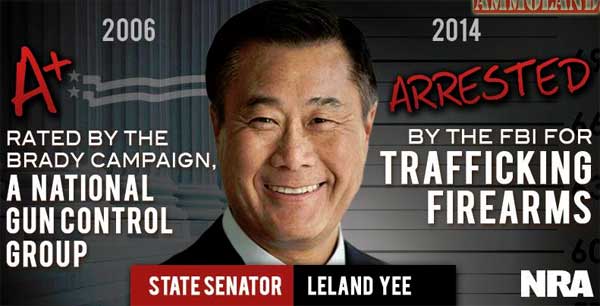
April
– U.S. Senator Dianne Feinstein (D-Cal.), sponsor of the federal “assault weapon” and “large” magazine “ban” of 1994-2004, asked President Barack Obama to direct the BATFE to reinterpret a provision of the Gun Control Act of 1968 to prohibit the importation of various semi-automatic firearms and their parts. Thanks to the efforts of NRA, and of our members who contacted their Senators in droves, NRA was able to block this extreme measure.
– Anti-gun former New York City Mayor Michael Bloomberg pledges $50 million for the gun control cause and consolidates his anti-gun groups Mayors Against Illegal Guns (MAIG) and Moms Demand Action under a single organization–Everytown for Gun Safety–with the stated goal to “outmuscle the National Rifle Association.”
– While Bloomberg struggled to mount an ineffectual grassroots campaign, more than 75,000 members and 600 vendors flocked to NRA’s 143rd Annual Meeting, all of them attending on their own dime. The contrast further affirmed that NRA supporters do not need a $50 million dollar sugar-daddy to rally and support their cause.
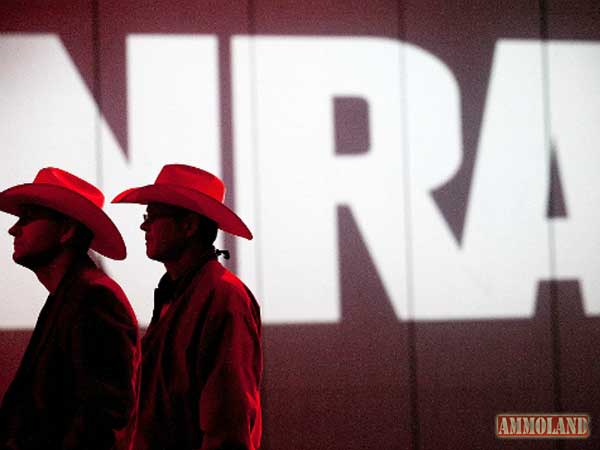
May
– NRA continued its support for the “Right-to-Carry Reciprocity Act of 2013” (H.R. 2959)–introduced in the U.S. House by Representatives. This legislation recognizes the right of those who hold a permit to carry a firearm in their home state to carry concealed firearms nationwide, subject to the laws governing manner and places of carry while in a particular state. Similar legislation passed the House in 2011 by an overwhelming bipartisan vote of 272-154. Federal Right-to-Carry Reciprocity legislation continues to be a top priority of NRA as a federally protected Constitutional right should not end at a state border.
– U.S. House Oversight and Government Reform Committee Chairman Darrell Issa (R-Calif.) released a staff report, The Department of Justice’s “Operation Choke Point”: Illegally Choking Off Legitimate Businesses? The U.S. Department of Justice, under anti-gun Attorney General Eric Holder, claimed the operation was aimed at combating mass-market consumer fraud by shutting down access to the banking and payment systems that are necessary for fraudulent businesses to operate. The report, however, concluded that the true goal of the operation is to “choke out” certain industries– including legal businesses that sell firearms and ammunition– which the current administration considers politically objectionable.
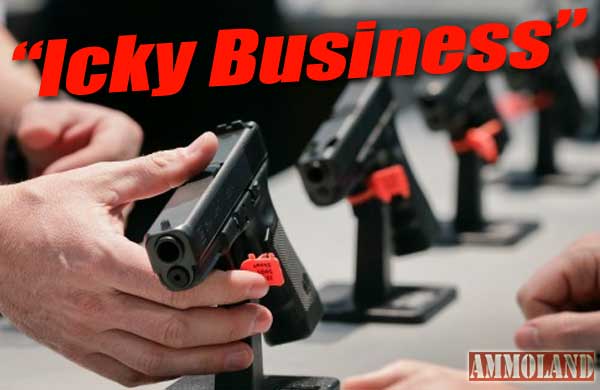
– The U.S. House Appropriations Committee approved the FY15 Commerce, Justice, Science Appropriations bill. The bill moved to the floor of the U.S. House where it was passed by a vote of 321-87. The bill contained a number of pro-gun provisions including: banning gun walking operations; preventing the Obama administration from using taxpayer dollars to implement the U.N. Arms Trade Treaty; and preventing the Obama administration from requiring registration records on the sale of more than one rifle or shotgun to law-abiding individuals in Texas, New Mexico, Arizona and California.
June
– Michael Bloomberg’s gun control operatives from Everytown for Gun Safety tried to mislead legislators and the general public with a list of firearm-related incidents in a report titled, “School Shootings in America Since Sandy Hook.” This factually inaccurate report listed, “at least 74” such incidents occurring since Sandy Hook. However, the list included incidents most reasonable Americans wouldn’t consider “school shootings” in the traditional sense, including: crimes (some involving gangs) that happened to take place on or near school grounds; incidents where no one was injured; suicides; accidental discharges; self-defense uses of force; and even an off-campus crime spree that ended with police shooting the perpetrator after he ran onto the grounds of a college. Most of the cases bore little or no resemblance to the Sandy Hook incident that the anti-gun Everytown group tried to invoke.
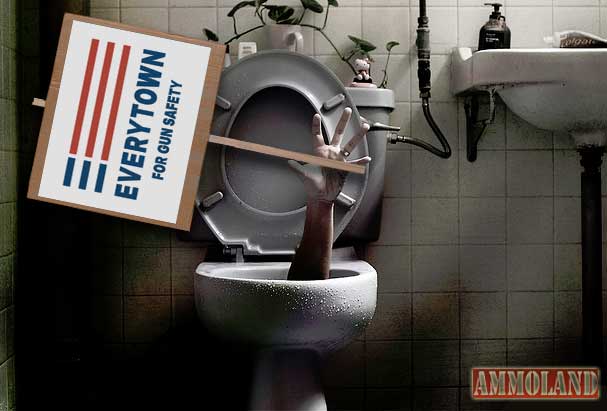
– President Obama once again shared his desire for Australian-style gun control while participating in a Q&A session involving social media website Tumblr. Australia’s severe gun control law, the National Firearms Agreement (NFA), includes many provisions that would be blatant violations of the Second Amendment.
– Mark Glaze, the executive director of Michael Bloomberg’s Mayors Against Illegal Guns (MAIG), resigned. Shortly after he resigned, he admitted that none of Bloomberg’s gun control offerings would stop mass shootings. While Glaze characterized this as a “messaging” problem, the policy objectives of Bloomberg go far beyond issues with messaging. They would violate constitutionally-protected rights, if adopted, and are recognized by ordinary Americans as too extreme.
July
– New Jersey’s Governor Chris Christie (R) vetoed legislation that would have banned the possession of ammunition magazines holding more than 10 rounds. Such magazines are most commonly used in handguns and general-purpose semi-automatic rifles kept for defensive purposes. New Jersey law is already strict enough, and the current restrictions have done nothing to reduce violent crime in New Jersey.
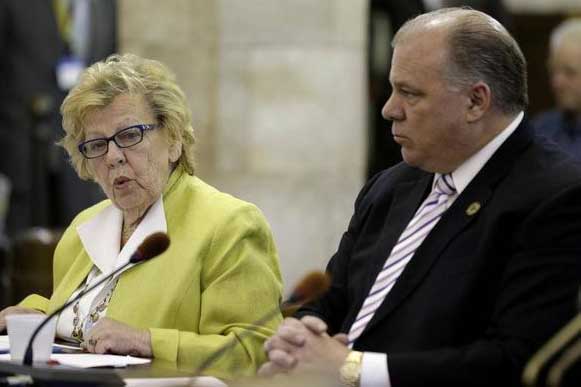
– Former New Orleans Mayor Ray Nagin (D) was sentenced to 10 years in prison for public corruption. The charges stemmed from actions Nagin took during his time as mayor of New Orleans. Nagin was infamous for ordering the unconstitutional confiscation of lawfully-owned firearms during Hurricane Katrina. The City of New Orleans later agreed to settle a lawsuit initiated by NRA and a permanent injunction was issued against the city, and then-Mayor Ray Nagin.
– The City of Chicago was again ordered by the court to pay NRA’s legal fees, this time $940,000, for work on Illinois Association of Firearm Retailers v. City of Chicago (formerly Benson v. City of Chicago). That case challenged the prohibition on lawful gun sales within the city. The order brought Chicago’s recent total for NRA legal fees to over $1.5 million.

– U.S. Court of Appeals for the Eleventh Circuit upheld Florida’s Firearm Owner’s Privacy Act. This law was passed after a series of events in which patients were harassed or denied access to services because they refused to be questioned by their doctors about their ownership of firearms.
– Beretta USA announced that it would be moving its Maryland operation to Tennessee. Beretta joined fellow firearm and firearm parts manufacturers, such as Remington, Kahr Arms, PTR Industries, Sturm, Ruger & Company, and Magpul Industries, all of which have either left states hostile to gun owners, or which have chosen to expand their operations in more gun-friendly areas. Beretta’s move could cost the so-called “Free State” millions in investment and 160 jobs.
August
– United States District Court for the District of Columbia issued a decision in Palmer v. District of Columbia, which challenged D.C.’s ban on carrying firearms in public for self-defense. The court’s decision struck down D.C.’s blanket prohibition on the right to carry outside one’s home.
– Superior Court Judge Michael Donio declined to dismiss a case for unlawful possession of a firearm against Philadelphia mother Shaneen Allen or to disturb the prosecution’s refusal to allow her to attend a diversion program to which she had already been accepted by the program’s director. Ms. Allen was arrested during a traffic stop after she volunteered to the officer that she had a firearm in her car. A concealed carry permitee with no criminal record, she mistakenly thought her Pennsylvania concealed carry permit was recognized by New Jersey. Ms. Allen’s difficult road over the next few months to avoid a mandatory prison sentence illustrated the need for federal Right-to-Carry Reciprocity legislation.
– Missouri’s primary election included a legislatively referred Constitutional Amendment to strengthen Missouri’s right to arms provision. Voters approved the amendment by a 61% to 39% margin.
– Billionaire Michael Bloomberg failed in his attempt to oust Milwaukee County Sheriff David Clarke from office. Bloomberg poured money and support into the campaign of Sheriff Clarke’s anti-gun challenger. Clarke, a strong supporter of the right of people to Keep and Bear Arms, was easily re-elected and confidently proclaimed, “I trust the voters. The voters can’t be bought.”

– United States District Court for the Eastern District of California issued an opinion holding that California’s 10-day waiting period for nearly all firearm sales violates the Second Amendment as applied to persons who either own a firearm already or have certain firearm-related licenses or certificates. The opinion, written by Judge Anthony W. Ishii, generally found California’s justifications for the waiting period insufficient to overcome the burden the waiting period placed on Californians’ right to keep and bear arms.
September
– U.S. Senate Majority Leader Harry Reid (D) aggressively tried to reverse the Citizens United v. Federal Election Commission decision (which invalidated unconstitutional restrictions on the ability to speak freely at election time of grassroots groups like NRA and others) by pushing “Senate Joint Resolution 19.” This was a proposed “Amendment to the Constitution of the United States relating to contributions and expenditures intended to affect elections.” S.J.R. 19 would have authorized burdensome federal and state regulation — or outright prohibition — of spending by corporations and other legal entities (like NRA) to do what many were created to do: protect the rights of their members at the ballot box. NRA and the activism of our members again blocked this anti-gun ploy to narrow the scope of the First Amendment.
– NRA supported the USA FREEDOM Act of 2014 as a positive step toward protecting the privacy of innocent Americans and ensuring that surveillance activities are properly and narrowly focused on actual threats to the nation’s security.
– In a major reversal by the Atlantic County Prosecutor, Pennsylvania mother and concealed carry permit holder Shaneen Allen was admitted to the Pre-Trial Intervention (PTI) program, ending a nightmarish, months-long miscarriage of justice. Allen was only given this opportunity to avoid conviction after the acting New Jersey attorney general issued an opinion clarifying the application of New Jersey’s mandatory sentencing scheme to certain minor firearm violations. That opinion, in turn, followed revelations that the same County Prosecutor who initially denied Allen’s request for PTI granted such an opportunity to Baltimore Raven Ray Rice after he knocked out his then-fiancée on video in a highly publicized incident.

October
– Multiple groups and media outlets damaged their own credibility and provoked countless disbelieving face palms by attempting to tie the NRA to the Ebola crisis. They groups absurdly claimed that NRA’s well-founded opposition to Obama’s nomination of anti-gun activist Vivek Murthy as Surgeon General exacerbated the Ebola outbreak, as Americans supposedly had nowhere else to turn for reliable information on the outbreak. Little airtime was given to the NRA’s legitimate concerns with the nominee or to any evidence that Murthy himself had a singular ability to effectively handle the nation’s Ebola response. Such outlandish assertions offer yet another example of gun control supporters use sensationalism to advance their anti-gun and anti-NRA agenda, no matter how ridiculous and desperate it reveals them to be.

– Eric Holder’s legacy of mismanagement, incompetence, and the politicization of federal law enforcement continued, as Judicial Watch, through a public records lawsuit against the City of Phoenix, uncovered more victims of the botched Operation Fast and Furious. An AK-47-type rifle involved in Operation Fast and Furious was used in a gang-style shooting in the city that left two people injured with multiple gunshot wounds. More victims may be discovered as evidence suppressed by Eric Holder and the Justice Department continues to come to light.
– A coalition of congressional representatives issued letters requesting internal investigators at the Department of Justice and FDIC to examine Operation Choke Point and any officials and staff involved in the program. Representative Blaine Luetkemeyer (R-Mo.), characterized Operation Choke Point as “a DOJ-initiated effort that aims to force businesses, many of which are licensed and legally-operating, out of the financial service space and therefore, out of business.” Operation Choke Point’s targets include firearm and ammunition manufacturers and retailers.
November
– On November 3rd, one day before the midterm elections, the U.S. Department of Justice released over 64,000 pages of materials pertaining to the infamous Operation Fast and Furious. Some, including former CBS reporter Sharyl Attkisson, who helped break the Fast and Furious story, have suggested that the timing of the document dump was calculated to ensure the release of the documents would not receive adequate press coverage due to the midterm elections. This document dump did not escape NRA’s or other watchdog groups’ notice, however.
– NRA-PVF achieved historic election victories, while anti-gun billionaire Michael Bloomberg was proven to be a political liability. The elections on November 4th proved to be a pro-gun tidal wave, with NRA having its best election night in over a decade. Of the 251 races we were involved in, we won 229, which translates into a 91% success rate. NRA-PVF endorsed candidates won hard-fought victories in Arkansas, Colorado, Georgia, Kansas, Kentucky, Iowa, Montana, Nebraska, North Carolina, South Dakota and West Virginia. And because of our members’ support and activism, NRA was pivotal in re-electing pro-gun governors in Florida, Georgia, Idaho, Kansas, Texas and Wisconsin, and in ousting a Bloomberg-backed anti-gun governor in Maryland. In addition, we had great success in races for the U.S. House.
– Mississippi voters exhibited a firm commitment to preserving their strong sporting traditions by ratifying NRA-supported Amendment 1. Eighty-eight percent of voters cast their ballots in favor of Amendment 1, which establishes an individual constitutional right to hunt, fish, and harvest wildlife.
– In conjunction with the release of its annual crime report for 2013, the FBI announced that all categories of violent and property crime declined from 2012 to 2013. From 2012 to 2013, the nation’s murder rate decreased five percent, to at least a 57-year low. The 2013 rate was down 56 percent from the all-time high recorded in 1980, and down 54 percent since 1991, when total violent crime hit an all-time high.
December
– Americans’ support for the Right to Keep and Bear Arms has sharply increased, and support for restricting gun ownership has sharply decreased, over the last two years, according to the results of a poll by the Pew Research Center for the People and the Press. The poll found that 57 percent of Americans believe that gun ownership does more to protect people from crime, while only 38 percent believe guns do more to put people at risk. Viewed in conjunction with Pew’s previous polls on the same topic, the percentage of Americans who believe that gun ownership protects people from crime has risen by nine points during the last two years, a period during which President Obama, Michael Bloomberg and other gun control supporters have campaigned relentlessly for restrictions on firearms and the Second Amendment. By comparison, the percentage believing gun ownership puts people at risk has risen only one percent.
About:
Established in 1975, the Institute for Legislative Action (ILA) is the “lobbying” arm of the National Rifle Association of America. ILA is responsible for preserving the right of all law-abiding individuals in the legislative, political, and legal arenas, to purchase, possess and use firearms for legitimate purposes as guaranteed by the Second Amendment to the U.S. Constitution. Visit: www.nra.org

